What is harmful and useful tea? Rules of use.
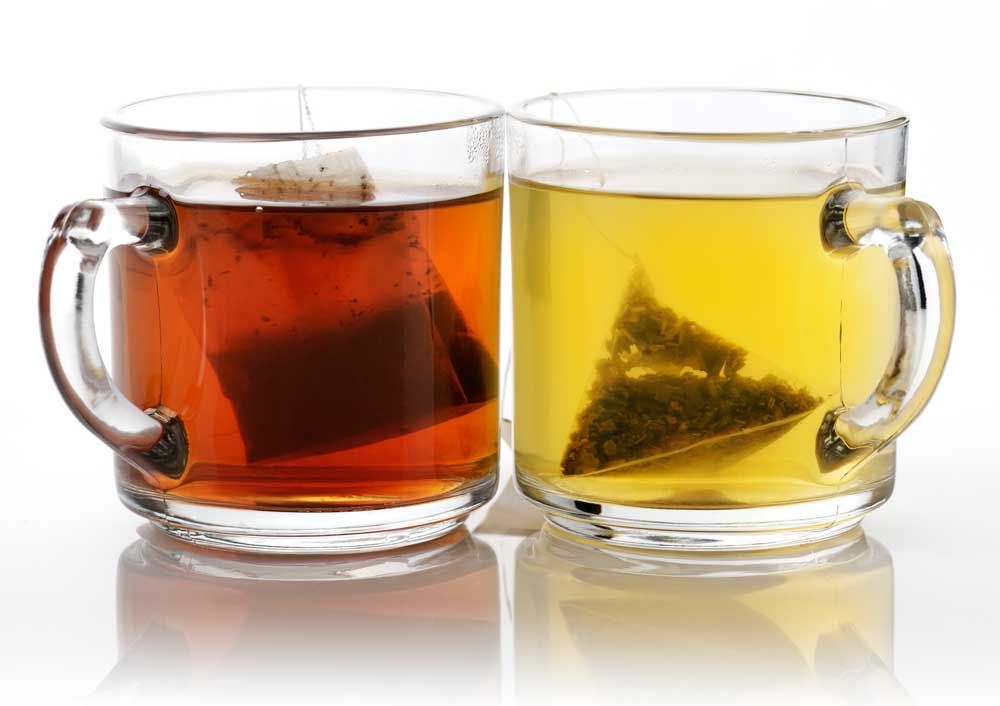
Tea ( Chinese "cha" in Beijing and Guangdong dialect, "te" in Amoy and "Tzai-e" in Taiwanese ) is a drink obtained by boiling, brewing and / or infusion of a leaf of a tea bush that is pre-prepared in a special way. Tea is also called the leaf of a tea bush itself, processed and prepared for the preparation of a drink. This preparation includes preliminary drying ( drying ), twisting, more or less prolonged enzymatic oxidation, final drying. Other operations are introduced into the process only for the production of certain species and varieties of tea. Sometimes the word "tea" is also used as the name of a tea bush - a species of plants of the genus Camellia of the Tea family; In the botanical scientific literature for this species is usually used the name Camellia Chinese ( Camellia sinensis ). In the broad sense, tea can be referred to as any drink prepared by brewing pre-prepared plant material. In the names of such drinks, the word "tea" is usually supplemented with an explanation describing the raw materials used ( "herbal tea", "berry tea", "fruit tea" and so on ).
Tea today is one of the most famous and favorite drinks. And, perhaps, there is not a single person who completely eliminated tea from his menu. But there are a lot of questions about the use of tea. For example: how much daily tea is safe for health? Is it good for today's trendy green tea? Is it true that tea is the best quencher of thirst in hot weather. Let's understand!
- Original name:

- Country of origin: PRC
- Author: unknown
- Year of creation: III millennia BC. E.
- Analogues: coffee
- Caloric value: 5 calories (black tea), 1 calorie (green tea), 21 calories (black tea with sugar)
All about tea
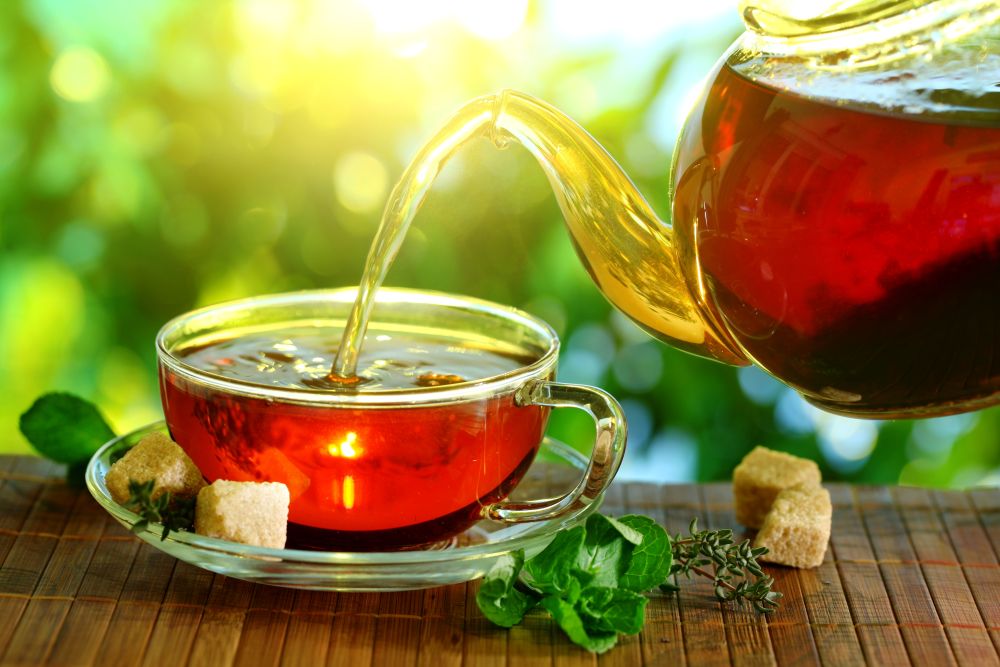
Tea is a drink from the leaves of a tea bush. In China, the unusual properties of these leaves were discovered a long time ago. And since then they invented new ways of processing, preparing and drinking tea. And each people took in China what they had to taste, and adapted it to their own food and traditions. According to experts, tea leaves contain about three hundred ingredients, including proteins, fats, more than 10 kinds of vitamins, as well as tea phenol, theine and lipid sugars. Therefore, tea nourishes the body, regulates physiological processes and has a general health effect. There is little caffeine in tea, but it is enough to cheer up the person and give him strength. In addition, tea is easy to prepare, economical and hygienic.
It turns out that you can drink tea all and in any quantities? Experts answer this question in the following way: tea, while observing certain rules of its use, is useful to almost everyone. This is the key phrase. Note: first, while observing the rules of use, and, secondly, to almost everyone, but not to everyone!
First you need to understand the existing types of tea. In the world grows more than 350 species of tea bushes, and the number of currently produced varieties of tea exceeds one thousand. By the way of processing, all teas are divided into the following main categories: Fermented tea, or red.
- Semi-fermented tea, or black. These two kinds of tea: red and black are the most common in us, we usually do not distinguish them and call them "black tea".
- Unfermented tea: green and white. \ "Green \" has recently become widespread in our country, but \ "white \" is not familiar to a few.
Tea with additives of natural fragrant flowers, or so-called \ "flower tea \". Note: speech in this case is only about natural supplements!
Why did we cite this classification here? The fact is that the choice of teas should be approached individually. Teas of different varieties vary greatly in composition and, as a consequence, in terms of their effect on the body.
Children can drink all sorts of tea, however, subject to a number of rules: do not give them more than 2-3 small cups a day, do not brew tea hard and do not drink it in the evening. In addition, the tea should be warm, not hot or cold.
In the adolescent period, green tea is especially useful. You can also drink red and black, but do not brew them hard. To teenagers with unstable psyche floral tea is very useful. He cleanses the liver and removes toxins, normalizes many age-related physiological processes. In general, experts recommend that children and adolescents drink slightly brewed tea, and rinse mouth with tea.
At a young and mature age, all the teas are very useful. Women, for example, are particularly recommended fermented red tea, and those wishing to lose weight - black, half-fermented. For people with gastric diseases, tea with mint is good, and for those suffering from liver diseases - floral. As for green tea, the content of vitamin C and tea phenol in it is much higher than in other types, therefore this tea has a much more pronounced antibacterial, antiradiation and antisclerotic effect, it effectively lowers the sugar content in the blood and improves blood composition. In addition, almost all floral teas are made on the basis of green, and have the same properties.
Elderly people, especially those suffering from constipation, strong green tea can be harmful, since it has a fixing effect. But red tea strengthens the stomach and is a good diuretic. Therefore, red tea is indispensable in old age.
Than tea is useful
And really, what is useful tea, because it, like coffee, contains caffeine. It turns out that tea caffeine acts on the body for a longer time. At the same time, tea caffeine has a stimulating effect on the cardiovascular system, kidneys, and the digestive tract.
Black tea
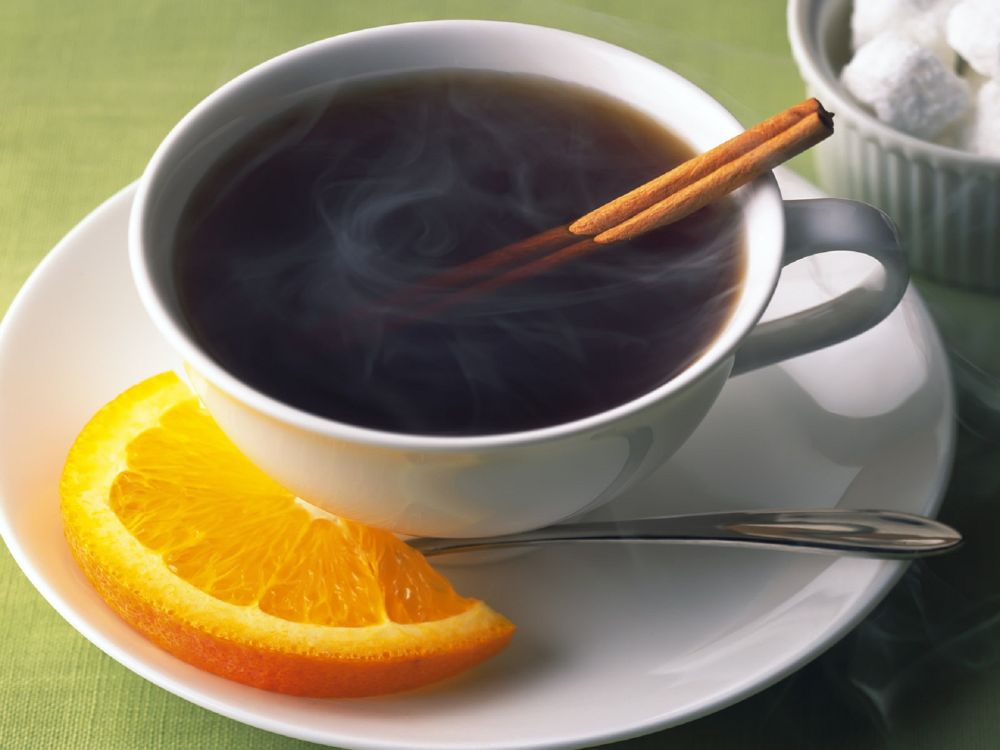
Black tea has P-vitamin activity, and, in addition, increases the absorption of vitamin C. Black tea is also useful because it strengthens the walls of blood vessels and saturates the body with antioxidants - substances that protect cells from pathogens, aging and exposure to harmful environmental factors.
Due to its ability to destroy pathogenic bacteria, black tea eliminates bad breath. Therefore, it is recommended that smokers should rinse their mouth with cold tea after a smoke break.
Many experts believe that tea has a warning effect against a stroke - this is due to the fact that under the influence of tea, cerebral blood flow increases, more oxygen enters the brain.
In addition, tea inhibits the formation of fat deposits on the inner surface of blood vessels, so the risk of developing sclerosis, hypertension and brain thrombi decreases.
Green tea
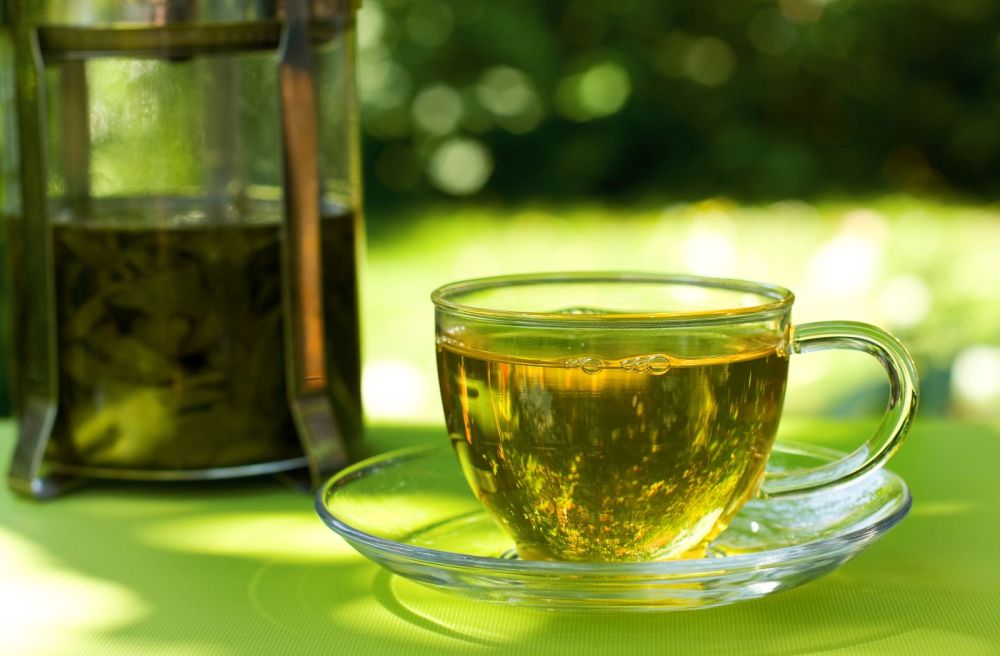
The effects that black tea possesses fully apply to green. Only in green tea they are even more pronounced.
Green tea contains epigallocatechin galate - a substance that is 100 times stronger than vitamin C and 25 times more than vitamin E protects body cells from harmful effects that cause cancer or cause cardiovascular diseases.
Green tea has rejuvenating properties and is effective for hangover syndrome: it is worth to drink a few cups of green tea, and the hangover passes quickly and painlessly.
The main thing is to make the right tea
In order to take full advantage of the drink, you should know how to make tea properly. For example, green tea can be brewed repeatedly, but preferably not more than five times. But black tea - no more than once. And, it should be drunk within fifteen minutes after brewing. Black tea has the most intensive process of spontaneous oxidation of aromatic constituents, phenol, lipoids, essential oils.
The way when concentrated concentrate tea is first made, which is then diluted with boiling water if necessary, can harm the body. In addition to oxidation, a film is formed on the tea surface, which is dangerous for the human digestive system. Therefore, you should drink tea immediately after it is brewed.
The rules of drinking tea
Now let's move on to the rules of drinking tea. In fact, there are a lot of them, but they are all very simple and reasonable. So:
- Do not drink tea on an empty stomach, just before or immediately after eating. It is best to drink it 20-30 minutes after eating.
- It is harmful to drink both scalding and cold tea: the optimum temperature of tea is 50-60 ° C.
- It is harmful to use strong tea often: the high content of caffeine and theine in it can cause headaches and insomnia.
- You can not make tea for a long time. This significantly reduces the nutritional value of the drink.
- It is better not to practice repeated brewing of tea. Usually, after the third or fourth tea leaves, there is not much left in the tea leaves, and harmful ingredients start to appear in the infusion.
- You can not drink medicine with tea. The Chinese say that tea destroys medicines.
- Do not drink yesterday's tea: it not only loses vitamins, but it also becomes an ideal nutrient medium for bacteria.
As for the amount of tea drunk per day, experts recommend drinking no more than 4-5 cups of light tea during the day. The exception, as we have already said, is only children, the upper limit for which is 2-3 cups. If you prefer strong tea, then limit yourself to 2-3 cups. In general, all calculations are made by experts, based on the fact that the cup is 3 grams of tea leaves. That is, a day should not eat more than 5-10 grams of tea.
Tea can be harmful
In addition to caffeine, tea contains theophylline, a substance that has a diuretic effect and excites the central nervous system. In addition, studies have shown that theophylline can inhibit the phosphoric acid compound, which leads to increased production of gastric acid. The decisive factor is the strength of tea and the amount of its infusions. The higher the strength, the more tea in caffeine, theophylline and other substances.
Another significant disadvantage of strong tea - it neutralizes and removes magnesium from the body. Meanwhile, it is magnesium that is responsible for the state of our nervous system. With its deficiency, there is a so-called syndrome of chronic fatigue with a typical general weakness and confusion in the mind. In addition, the lack of magnesium leads to meteorological dependence, nightmares, muscle tension and spasms. Therefore, tea lovers should definitely include in the diet foods rich in magnesium salts - apricots, peaches, cauliflower, nuts, bran, beans.
Tea can be harmful because it can contain flavors and colorants. In addition, hot tea burns internal organs, and as a result, painful changes in these organs can begin.
The zealous tea lovers may have problems with their teeth. Because of black tea, for example, teeth turn yellow. And from green tea, if you drink more than 5 cups a day, the enamel on the teeth is destroyed.
Also, you should know that green tea has a fixing property, and therefore it is not necessary to drink it to people who suffer from constipation. Contraindicated in green tea and hypotension, as it lowers blood pressure.
It is not recommended to drink tea at high temperature, because tea, especially strong, increases the body temperature. And in no case can not drink down tea medications, including multivitamins. With this combination, there is often a sediment, and as a result, the preparations are not absorbed by the body.
Categories of people that experts recommend drinking less tea
First, pregnant women. After all, tea contains a certain amount of caffeine, which, stimulating the fetus, negatively affects its development. In addition, caffeine causes an increase in heart rate and increases urination, which increases the burden on the heart and kidneys, and thus increases the likelihood of developing toxicosis
Secondly, the peptic ulcer. Although tea and helps digestion, but suffering from a stomach ulcer and duodenal ulcer, as well as high acidity in the stomach should be observed moderation. Peptic ulcers are advised to limit the consumption of tea, excluding strong at all. It is best for them to drink tea with milk and sugar.
Thirdly, people suffering from atherosclerosis and hypertension in severe form. Patients with a similar diagnosis should drink tea with caution, and during periods of exacerbation in general, give up the use of red and strongly brewed tea.
Fourthly, people who suffer from insomnia. Although insomnia can have a variety of causes, you should not drink tea shortly before sleep - due to the exciting effects of caffeine and fragrances. A cup of tea, especially strong, before going to sleep, leads a person into a state of excitement, and it becomes almost impossible to fall asleep.
Fifth, patients with high fever. It is considered that a strong hot tea quenches thirst well, and therefore is useful at elevated temperature. But this is not so. Scientists have found that theophylline, contained in tea, raises body temperature. Theophylline also has a diuretic effect, and therefore it makes any antipyretic drugs ineffective or ineffective.
Note that the use of tea, like any other drink, the process is purely individual for everyone. Personally for me - I, for example, well tolerate both green and black tea, strongly or slightly brewed. Observe all of the above rules and restrictions - if, of course, you care about yourself and your health!

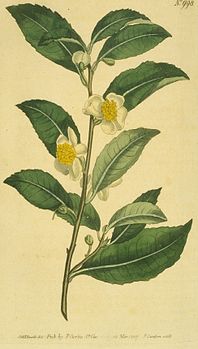


Comments
When commenting on, remember that the content and tone of your message can hurt the feelings of real people, show respect and tolerance to your interlocutors even if you do not share their opinion, your behavior in the conditions of freedom of expression and anonymity provided by the Internet, changes Not only virtual, but also the real world. All comments are hidden from the index, spam is controlled.